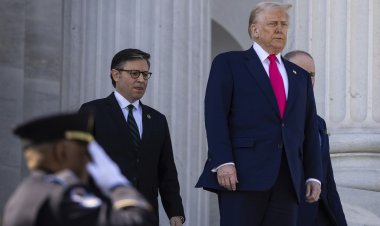China's Potential Losses in the India-Pakistan Crisis: An Overview
Beijing must navigate a delicate balance between its enduring ally and its regional competitor to safeguard its interests. Amid renewed tensions between India and Pakistan following a deadly attack in Kashmir last week, China finds itself in...

Amid renewed tensions between India and Pakistan following a deadly attack in Kashmir last week, China finds itself in a challenging position. It is caught between its strong commitment to Islamabad and its desire to cultivate economic ties and improve relations with New Delhi.
In light of the violence and escalating tensions in the region, Beijing has urged both India and Pakistan to exercise restraint, peacefully resolve their conflicts, and collaborate to achieve regional peace and stability. This type of rhetoric is typical of China’s diplomatic approach, which emphasizes predictability and stability, allowing Beijing to advance its economic interests and continue business operations wherever feasible. However, this rhetoric often does not yield concrete actions, as Beijing adheres to a non-alignment policy and is reluctant to involve itself in third-party disputes.
While it advocates for principles of peaceful coexistence, China is cautious about assuming an active security and military role internationally. Engaging more deeply in security affairs could compromise its image as a peaceful power resistant to hegemony and traditional great power rivalries. Furthermore, China’s neutrality can inadvertently serve to benefit one of the parties in conflict; currently, it appears that Pakistan, rather than India, reaps more from China's neutral stance.
Although China condemned the attack in Pahalgam, it declined to provide support to India and did not share New Delhi’s interpretation of the incident. Instead of endorsing the allegations connecting Pakistan to the attack, Beijing backed Pakistan’s call for a prompt and impartial investigation. In a conversation with his Pakistani counterpart on April 27, Foreign Minister Wang Yi emphasized that China acknowledges the legitimate security concerns of its ‘ironclad friends’ in Islamabad and supports Pakistan in safeguarding its sovereignty and security. Wang’s statements reveal Beijing’s serious commitments to Islamabad and its cautious approach toward India.
This nuanced position has historical and geopolitical roots. Since the partition of India in 1947, India and Pakistan have experienced significant conflict, leading to multiple military confrontations. Territorial claims are a primary source of this animosity, particularly regarding Kashmir, which is divided among India, Pakistan, and China, causing frustration in all three capitals. Additionally, Pakistan’s cession of certain territories to China in 1963 remains unrecognized by India, further straining relations. Consequently, India typically struggles to view China as an impartial mediator in ongoing disputes, as Beijing’s involvement is perceived as too significant.
China's role in this triangle is further complicated by Pakistan's emergence as Beijing’s closest strategic partner. The breadth of bilateral cooperation extends far beyond typical relationships between China and other regional players. When Xi Jinping initiated the Belt and Road Initiative in 2013, the Sino-Pakistani economic corridor became a flagship project, granting China direct access to the Arabian Sea via Gwadar Port and strengthening its strategic position in the region. This collaboration has been met with strong opposition from India, especially as some projects take place in disputed territories in Kashmir. Moreover, India harbors concerns over the deepening defense and military ties between Islamabad and Beijing, as China has become Pakistan’s primary arms supplier, engaging in joint training, military technology transfers, and intelligence sharing.
Geopolitical and economic motivations drive China’s investment in Pakistan. Its partnership with Islamabad serves as leverage against New Delhi and counters India's regional aspirations. A strong, stable India, however, does not inherently conflict with China's interests. Despite their tensions, India ranks as one of China’s top trading partners, offering substantial opportunities in its domestic market. Ironically, the current conflict between India and Pakistan comes at a time when Sino-Indian relations have been improving, with recent agreements to de-escalate border tensions and resume direct flights. The situation in Kashmir threatens to undermine this progress.
While Sino-Indian relations have seen fluctuations between cautious cooperation and military confrontations, China may be willing to address India’s concerns for various reasons. New Delhi is currently confronting the threat posed by terrorism and Islamist groups, a concern that similarly resonates with Beijing, which is dealing with separatist pressures in Xinjiang. Moreover, India’s efforts to stabilize Kashmir align with Beijing’s approach to its own border regions, presenting a mutual interest in countering challenges to their central authorities. Additionally, China has directly faced attacks against its citizens in Pakistan, raising doubts about the effectiveness of siding with the Pakistani government while maintaining its stance against extremism and terrorism.
China has a vested interest in preventing the region from becoming a hotbed of extremism or great power rivalries. Instability in Kashmir or in Pakistan’s tribal areas poses a direct threat to Beijing’s internal stability and its western frontiers. A military conflict between India and Pakistan would significantly impact China by endangering the China-Pakistan Economic Corridor, destabilizing Xinjiang, and potentially involving other global powers, thereby hindering Beijing’s long-term regional goals.
Moreover, the current crisis presents an opportunity for constructive engagement between Beijing and Washington, given both India and Pakistan's traditional status as important partners of the U.S. Despite China and the U.S. having adopted similar political stances, there has yet to be a concerted effort to actively align their approaches to the situation.
Camille Lefevre for TROIB News












